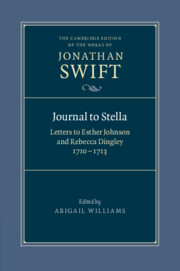Book contents
- Frontmatter
- Contents
- List of Illustrations Page
- General Editors’ Preface
- Acknowledgements
- Chronology
- List of Abbreviations
- Introduction
- Calendar of Letters
- Letters to Esther Johnson and Rebecca Dingley, 1710–1713
- Appendices
- A Swift, Harley, St John and the Political Debates Behind the Journal to Stella
- B Surviving Letters to and From Esther Johnson and Rebecca Dingley
- C Letter 2 in Print and Manuscript
- D Facsimile of Letter From Esther Johnson and Rebecca Dingley to Robert Dingley
- E Glossary of Little Language Used in the Journal to Stella
- F Biographical Appendix
- Textual Account
- Bibliography
- Index
A - Swift, Harley, St John and the Political Debates Behind the Journal to Stella
Published online by Cambridge University Press: 02 September 2021
- Frontmatter
- Contents
- List of Illustrations Page
- General Editors’ Preface
- Acknowledgements
- Chronology
- List of Abbreviations
- Introduction
- Calendar of Letters
- Letters to Esther Johnson and Rebecca Dingley, 1710–1713
- Appendices
- A Swift, Harley, St John and the Political Debates Behind the Journal to Stella
- B Surviving Letters to and From Esther Johnson and Rebecca Dingley
- C Letter 2 in Print and Manuscript
- D Facsimile of Letter From Esther Johnson and Rebecca Dingley to Robert Dingley
- E Glossary of Little Language Used in the Journal to Stella
- F Biographical Appendix
- Textual Account
- Bibliography
- Index
Summary
Swift was to look back on his time in London from 1710 to 1713, the period covered by the Journal to Stella letters, as the golden age of his political involvement. During these years, ministerial policy was determined by the competing personalities of Robert Harley and Henry St John, and the Journal to Stella offers us the primary evidence of Swift's service to and affection for both men. The political debates of the era were shaped by the ongoingWar of the Spanish Succession, and concern over the Protestant succession on the eventual death of Queen Anne. In the years covered by the letters collected here, the fragile Tory ministry promoted a European peace which abandoned Great Britain's candidate for the throne of Spain, theHabsburg claimant ‘Charles III’, for his French Bourbon rival, Philip V, and threatened to rewrite the diplomatic priorities maintained by England since the Glorious Revolution of 1688. In turn, this encouraged speculation that the ministry, or elements in it, threatened the Protestant succession, and were plotting that Queen Anne should be succeeded by her half-brother, already regarded by Jacobites as James ‘III’ of England, rather than by theGerman Lutheran Hanoverians. There was real anxiety amongst high churchmen – among whom Swift is usually numbered – that the episcopal settlement of the established Churches in England and Ireland would be threatened to such an extent by a foreign Protestant prince, and a restoredWhig party promoting the interest of Protestant Dissenters, that a Roman Catholic would be preferable. The Journal to Stella refracts these debates in various ways. Although Swift often presents the news in the letters as confidential and of the moment, there are in general fewer political secrets contained within them than this suggests. It is clear even from the Journal that he was not an insider: he knew nothing, for example, of the secret peace negotiations with France that Harley and Shrewsbury opened in August 1710. Nor did he know of Harley's policy about parliamentary investigations into alleged mismanagement of the treasury, for which the new Tory members were clamouring in December 1710. Yet the Journal is, nonetheless, instructive as the memoir and self-representation of a life lived on the edge of great events.
- Type
- Chapter
- Information
- Journal to StellaLetters to Esther Johnson and Rebecca Dingley, 1710–1713, pp. 543 - 558Publisher: Cambridge University PressPrint publication year: 2013



